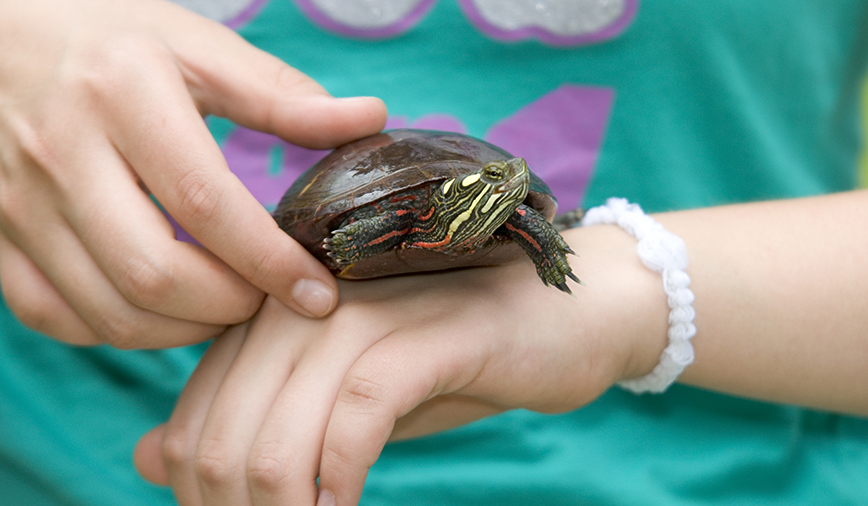February 27, 2015
Bird Tracks
A young painted turtle was one of many creatures discovered by participants in the St. Charles Park District’s Rod N Reel nature camp.
It’s been said, on bumper stickers as well as refrigerator magnets, wooden plaques other sources of sage advice, that a bad day of fishing is better than a good day of work. And as this week concludes, I’m inclined to agree.
Monday through Friday I was lucky enough to be an instructor for Rod N Reel Camp, one of several themed nature camps we’re offering at Hickory Knolls this summer. As you can probably surmise from its name, the program offered kids in grades 6-10–plus two aides in their 20s and a 50-something year old kid-at-heart–the chance to immerse themselves in all things fish for six hours each day.
We practiced knot tying and casting; experimented with live baits and lures; fished ponds and streams; learned about gamefish and non-game species; and, best of all, had a whale of a time. (I know, a whale is a mammal. But I don’t think “a bass of a time” would carry the same meaning. So quit yer carping. Har har…)
Over the course of the week we caught bluegills and green sunfish, yellow perch and largemouth bass. We watched a flyfisherman land not one but two quillback carpsuckers–a neat bottom-feeding and beneficial native fish often mistaken for the common carp–a troublesome nonnative noted for uprooting vegetation and disrupting aquatic ecosystems.
We were also treated to the many sights and sounds of river and pond life. At Panton Mill Park, just below the South Elgin dam, we watched egrets and great blue herons feast on fish they plucked out of the raging current. At Blackwell Forest Preserve in Warrenville, we saw double-crested cormorants dive beneath the surface of Silver Lake and come up with fishy prey just about every time. At Delnor Woods Park in St. Charles, we got scolded–pretty severely, I might add–by a green heron that swooped down toward what must have been its usual fishing spot, only to be surprised by the sight of 10 middle schoolers catching sunfish almost as quickly as their lines hit the water.
We admired painted turtles basking in the sun, and marveled at the well-armored shell of a young snapping turtle that found itself, by some strange twist of fate, on the same gravel path as us. With a shell length of about six inches, it had grown well past the hatchling stage when mortality is highest, and will likely enjoy a lifespan 30 years or more–provided it learns to bask on paths a little less traveled.
We caught green frogs and bullfrogs by hand and with a net (and once, by accident, with a hook. But since we’d flattened the barbs to make removal easy, the big frog escaped with barely a scratch. With any luck at all, it also took away a new learned behavior: resisting the urge to bite at shiny metal objects that have worms skewered on them.)
Yesterday we laid down our rods and reels and spent the day at LeRoy Oakes Forest Preserve, learning about the wonderful array of non-game fish native to our area. Using kick seines and dip nets, we explored the riffles and funs of Ferson Creek, catching and releasing a really nice variety of darters and minnows. We were also lucky enough to find a hellgrammite, a.k.a. devil scratcher, a bigger-than-my-pinky-finger critter that actually is the larva of the dobsonfly—a bigger-than-my-index-finger insect that is found only near high-quality streams.
Along the way we ran into a hatchling painted turtle, making its way toward a pond; prodigious quantities of frogs and toads of various species; and more northern water snakes than I’ve seen in a very long time.
I suppose that by true fishermen’s standards, our outings were a bust. The biggest fish we caught was a fat sunfish that weighed maybe 8 oz.; and for every fish we caught there were many others that just took our bait and swam away.
If we’d been fishing to feed ourselves, we’d have been hungry for sure. But we had a lot of good, clean fun, and the memories we made will last way longer than any fish dinner.
Another fishing quote I’m fond of goes, “If people concentrated on the really important things in life, there’d be a shortage of fishing poles.”
Here’s hoping that will one day be the case.
Pam Erickson Otto is the manager of nature programs and interpretive services at the Hickory Knolls Discovery Center, a facility of the St. Charles Park District. She can be reached at 630-513-4346 or potto@stcparks.org.

